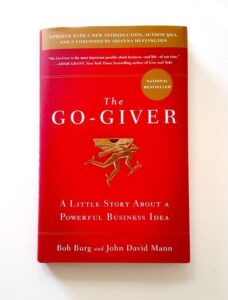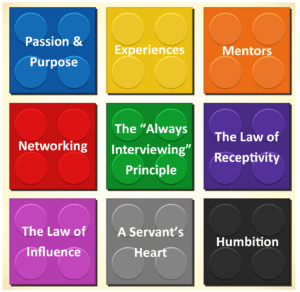 Continuing in our Building Blocks of Your Career series, we now approach No. 7 of 9: “The Law of Influence”. Drawing once again from the highly regarded book, the Go-Giver, author Bob Burg shared the “Five Laws of Stratospheric Success.”
Continuing in our Building Blocks of Your Career series, we now approach No. 7 of 9: “The Law of Influence”. Drawing once again from the highly regarded book, the Go-Giver, author Bob Burg shared the “Five Laws of Stratospheric Success.”
Click here to see/hear this chapter read in a video in just over 10 minutes
In a quick summary, a summary on Burg’s perspective on The Law of Influence is available online here and it states, “The Law of Influence: Your influence is determined by how abundantly you place other people’s interests first.” Along with that, Bhaavin Shah SSY (Holistic Life Coach) summarized his findings from The Law of Influence in the following phrases:
“All things being equal, people like to do business with those they know, like and trust.”
- We know this is a reality as golf professionals. As merchandisers, we buy from the reps we like, know and trust. We also have OEM equipment staff deals because our members, customers and students are more likely to trust our perspective regarding their golf equipment choices and purchase decisions.
- Key takeaway #1: Understand the value of your influence is based in being both likable and worthy of the trust that is entrusted to you. In fact, you are responsible for nurturing that trust, not those you influence (or may wish to influence.)
- Key takeaway #2: Though it’s not about you, the actual value of this influence when it drives revenues, sales and loyalty is supremely important to your employer; as such, it has significant implications on your compensation and job stability.
“It’s not what you know, it’s who you know. It’s not who you know, it’s about who knows you. It’s now who knows you, it’s who knows about you.”
- I like how this statement goes beyond “who you know.” It ups the bar a bit in terms of influence as it adds in the dimension of “who knows you AND what your reputation is” with them and those they respect besides you. (Of course, there are those who don’t want to like and/or trust us, and won’t give us any chance to influence them. Oh well. Let’s focus on those who are open to us.)
- Key takeaway #1: As with the first statement about likability and trust, we must also understand the value of our influence is nurtured (either enhanced or torn at) by our reputation. As noted previously in this article series, when it comes to our reputation we are “always interviewing” and our reputation is a current snapshot of our “influence resume.” Take care to manage this “who knows about you” concept with intentionality.
“The influence carried through pushing doesn’t go so far. Pulling has a great power just like pulling a rope vs pushing a rope.”
- First off, this is a strong analogy and it clearly makes the point. Pulling also allows the one pulling to engage their full energy into the effort, while engaging the ground at the same time utilizing gravity and grip to its fullest. Pushing on a rope fights against gravity that pulls down the rope and certainly makes it ineffective.
- Key takeaway #1: Pulling on a rope is very effective, especially when someone or something is going the wrong direction. Picture someone about to go over a cliff or similar. But, we know that being pulled in that manner (as if to save their life, or save them from a huge misstep) is not comfortable for either party.
- Contrary concept (slightly) #1: The idea of pushing with a rope is clearly not a good one. But, the idea of pushing (gently, as with a nudge from the hand of one person to another), is very much a picture of influence. The difference between the touch of a hand vs through a “thin, limp rope” is massive too. One’s ability to touch another, literally or figuratively, belies a level of trust that is earned and entrusted. The vision of the rope implies some artificial level of connection vs a trusted natural connection.
“Your biggest markets come not from your friends, but from friends of your friends.”
- Another obvious one that really makes sense, but it infers the “market of influence” comes from how much influence we have (built on likability, trust and reputation) with those we influence and their willingness to leverage their influence in a way that is beneficial to us and/or our cause.
- Key takeaway #1: The idea that someone is willing to put their influence (aka their reputation) on the line for us, our facility, our cause is significant. It must never be taken for granted, and those who have the greatest influence understand this. They nurture their influence, welcome feedback, accept influence from others in a reciprocal way, etc.
“The Law of 250 says that each of us has a circle of 250 people we know, each of who has one such circle. So the potential is huge.”
- The Law of 250 implies the “market of influence” nearly everyone has. In golf, due to the role most golf professionals have, industry experts estimate the market of influence is typically around 600 people. If this is true, and we combine the concept of “friends of your friends” it could be 4-5x that number. (Insert the appropriate sentence earlier in this piece regarding the importance of nurturing/protecting your “market of influence.”)
- Key takeaway #1: In terms of building one’s career this final bullet is a fine summation of The Law of Influence. One’s ability to be likable, be worthy of trust, to maintain a strong reputation with as many people (and their friends) as possible has a both a direct and indirect impact on one’s ability to drive value, revenue and more influence for the team, employer and/or brand one is partnered with.
- Key takeaway #2: Those who have the maximum influence, developed through years of nurturing and investment in their influence. Naturally, they tend to be protective of that influence and don’t just “lend it out” to just anyone. Not that they won’t do it, they carefully evaluate who they will trust it with. In many ways, when someone you admire, or someone who inspires and influences you trusts you with their “brand” or reputation, they are giving you a tremendous compliment (so treat it as such.)

In closing, the Go-Giver book provides us with a unique look at The Law of Influence. I would be remiss to not mention what another leadership expert, John Maxwell has to say about it. He wrote, in the book, “The 21 Irrefutable Laws of Leadership” that, “The true measure of leadership is influence – nothing more, nothing less.”
Some key takeaways from this statement in his book include:
- “The greatness of a leader is not measured by the amount of money one makes or position one has, but by the amount of lives one influences.” (It is advisable to learn and employ this law early in one’s career.)
- Mark Brown of the John C Maxwell Group wrote: “You can build influence through your character, your relationships, your knowledge, your intuition, and your experience. But the most critical method for building your influence is through what you can do for others.” (Did you catch the manner in which this statement and Burg’s take on The Law of Influence correlate?)
- Mack Story, author of the Blue Collar Leadership blog, wrote a noteworthy statement on Maxwell’s writing too. He wrote, “Everything rises and falls on influence. Think about it. Who will earn more over a lifetime? Someone with more or less influence? Who will get the promotion or the new job? The person with the most influence or someone else? Who will have better relationships professionally and personally? Someone with more or less influence? The last time you were sad, mad, upset, frustrated, irritated, etc. was it because you had too much influence or not enough? Leadership is influence. Therefore, everyone is a leader. Why? Because, everyone has influence. This means, on a scale of 1 to 10, everyone IS on the scale.”
I really appreciate the picture of Story’s writing there when he wrote “everyone IS on the scale.” We are all on the scale of influence, and we all have the ability to enhance our position on the scale. We have the power to make the right choices, take the right steps and build more significant relationships with intentionality one day at a time. As we approach this year with more hope, let’s do so with the intentionality necessary to build, nurture and enhance our own influence and those that we are privileged to mentor.
Monte Koch, PGA Certified Professional/Player Development | Career Consultant
PGA Career Services | PGA of America
Serving PGA professionals, employers in the Pacific NW & Rocky Mountain PGA Sections
Email: Mkoch@pgahq.com Cell: 206/335-5260
Lea Hill, WA | My LinkedIn | My Professional Blog
Click HERE to Begin Our New Career Planning Program